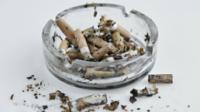Risks and causes of oesophageal cancer
Your risk of developing oesophageal cancer depends on many things including your age, lifestyle and other medical conditions.
Anything that can increase your risk of cancer is called a risk factor. Those that lower the risk are called protective factors.
Having one or more risk factors doesn’t mean that you will definitely get oesophageal cancer.
Age and gender
Cancer of the oesophagus is more common in older people. Around 40 out of 100 oesophageal cancers (around 40%) develop in people aged 75 and over.
Men are more likely to have oesophageal cancer than women.
Smoking or using tobacco

Smoking increases your risk of the 2 main types of oesophageal cancer – squamous cell cancer and adenocarcinoma. Around 35 out of 100 oesophageal cancer cases (around 35%) in the UK are caused by smoking.
Smoking and drinking together further increases the risk of some oesophageal cancers more than either by itself.
Your risk increases the longer you smoke. It's never too late to give up but the sooner you stop, the better.
You also have an increased risk of oesophageal cancer if you:
- chew tobacco
- chew areca nut
- use snuff
- use betel quid (paan or pan)
Being overweight or obese
Being overweight or obese increases your risk of getting oesophageal adenocarcinoma. More than 25 out of 100 oesophageal cancers (more than 25%) in the UK are caused by being overweight or obese. The more overweight you are the higher your risk.
Obesity means being very overweight with a body mass index (BMI) of 30 or higher. Adults who have a BMI of 25 to 29.9 are overweight.
Try to maintain a healthy weight by being active and eating a healthy diet.
Alcohol

Drinking alcohol increases your risk of squamous cell oesophageal cancer. The more you drink, the higher your risk of developing cancer.
Your risk is higher if you drink and smoke but your risk reduces after you stop smoking or drinking.
Barrett's oesophagus
Barrett's oesophagus increases your risk of oesophageal cancer, although the risk is still small. Many people with Barrett’s oesophagus do not develop cancer.
Barrett's oesophagus is a condition where the cells lining your oesophagus have become abnormal. This can happen due to long term acid indigestion (acid reflux). Not everyone with Barrett's oesophagus has reflux.
Between 3 and 13 people out of 100 (between 3 and 13%) with Barrett’s oesophagus in the UK will develop oesophageal adenocarcinoma in their lifetime. And each year, less than 1 in 100 people with Barrett’s (less than 1%) develop oesophageal adenocarcinoma. Your risk of developing oesophageal cancer is higher if you have more severe cell changes (high grade dysplasia).
Your risk is also affected by how long the area of Barrett’s is. People with longer areas of Barrett’s have a higher risk than people with shorter areas.
Gastro oesophageal reflux disease
Gastro oesophageal reflux disease (GORD) increases your risk of developing oesophageal adenocarcinoma. The longer or more often you have symptoms, the higher your risk.
GORD is a common condition where stomach acid flows back into the oesophagus from the stomach. This is called acid reflux. Symptoms include chronic heartburn and indigestion.
Radiotherapy
Radiotherapy for other cancers slightly increases your risk of oesophageal cancer, including:
- breast cancer
- lung cancer
- oropharyngeal cancer
- laryngeal cancer
Your risk of getting oesophageal cancer is still small. You would be at a higher risk from your existing cancer if you didn't have the radiotherapy your doctor recommends.
Achlasia
Achalasia is a rare condition that affects the nerves and muscles in your oesophagus and makes it difficult to swallow.
Having achalasia can increase your risk of oesophageal cancer.
Other possible causes
You might have heard of other possible causes of cancer. Stories about potential causes are often in the media. And it isn’t always clear which ideas are supported by evidence.
We haven’t included them here, either because there is no evidence about them or it is less clear.
Reducing your risk
There are ways to reduce your risk of cancer.



